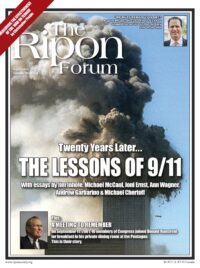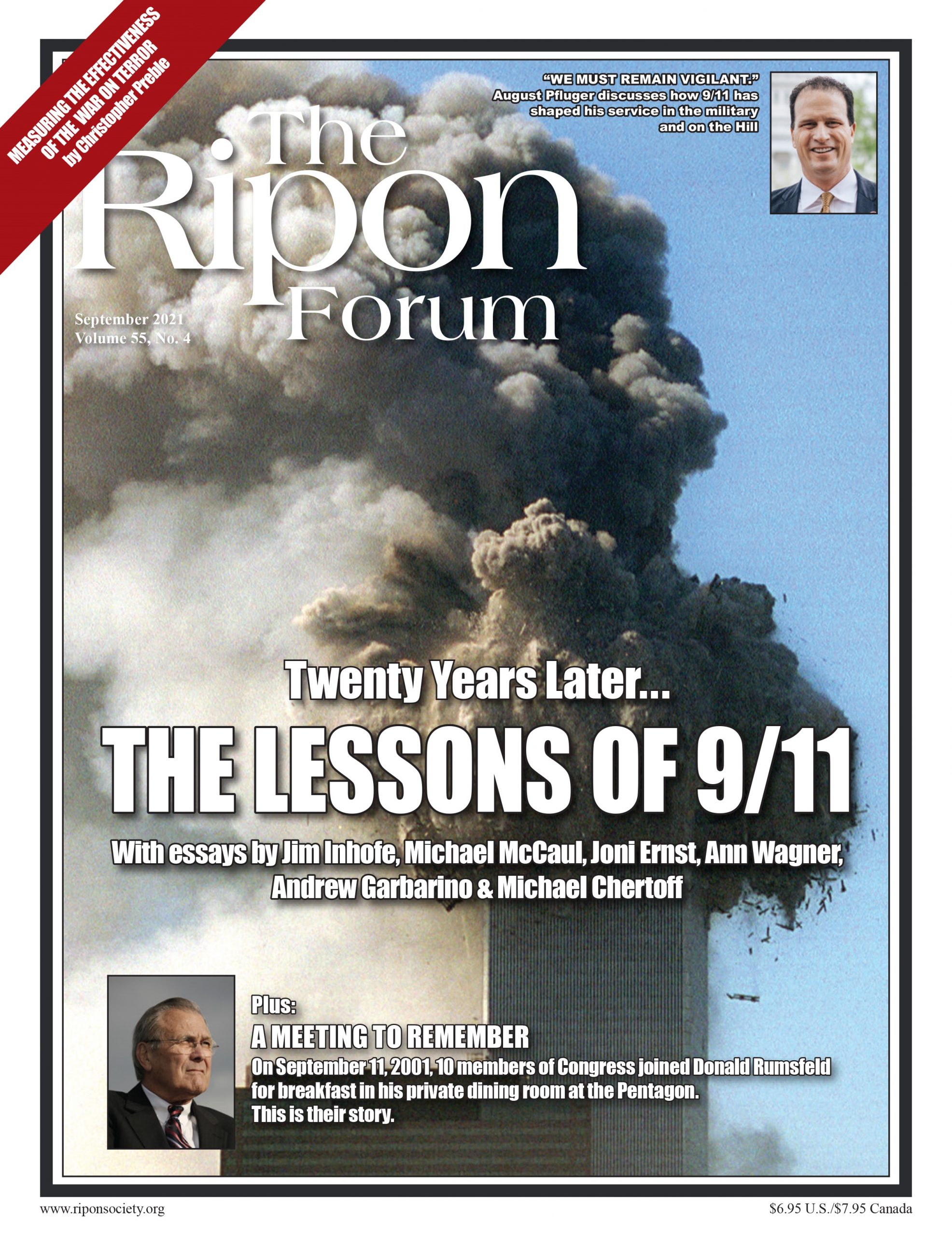On December 7, 1961, President John F. Kennedy appeared at the AFL-CIO Convention in Miami, delivering a speech that opened with his calling attention to the solemn anniversary the nation was marking that day.
“I suppose really,” Kennedy began, “the only two dates that most people remember where they were were Pearl Harbor and the death of President Franklin Roosevelt. We face entirely different challenges on this Pearl Harbor. In many ways the challenges are more serious, and in a sense long-reaching, because I don’t think that any of us had any doubt in those days that the United States would survive and prevail and our strength increase.”
Today, of course, the two dates that most Americans of a certain age remember are Kennedy’s own death two years later and the attacks of September 11, 2001. And as America marks the 20th anniversary of what many have called the younger generation’s Pearl Harbor, it is fitting that we stop what we are doing and remember the nearly 3,000 lives that were lost on 9/11, and the many thousands more that have been lost on the fields of battle in the years since.
At the same time, it is also worth pausing to reflect how the September 11th terrorist attacks changed America. In this edition of The Ripon Forum, we attempt to do just that with a series of essays that examine the lessons that were learned on that fateful day. Those writing for this edition include U.S. Sen. Jim Inhofe, the Ranking Member of the Senate Armed Services Committee, Michael McCaul, the Ranking Member of the House Foreign Affairs Committee, and Michael Chertoff, the former Secretary of Homeland Security under President Bush. Also writing are three other leading voices on homeland security and national security — U.S. Sen. Joni Ernst, U.S. Rep. Ann Wagner, and U.S. Rep Andrew Garbarino, who grew up less than 60 miles from where the Twin Towers once stood.
Two themes stand out in their essays. The first theme is that when it comes to lessons learned from 9/11, President Biden has not learned many. The consensus is that the President’s decision to withdraw U.S. forces from Afghanistan has increased the risk we face from a terrorist attack. At the same time, the haphazard nature of the withdrawal has decreased the trust and confidence that other nations have in us. In short, the decision is a disaster that has left the American people less secure and damaged America’s reputation around the world.
The second theme that emerges from their essays is that the country needs to pull together like it did after 9/11 and that unity is one of the best weapons we have in confronting the threat of terrorism, whether that threat is from overseas or here at home. Citing the 9/11 Commission, which investigated many of the failures that made the September 11th attacks possible, Chertoff also makes an explicit appeal to members of Congress to get behind a similar investigation today. “I call on our elected officials,” he writes, “to support the January 6th Commission with the same unity and sense of purpose that was present in the aftermath of 9/11.”
On the morning of 9/11, 10 Republican members of Congress joined Donald Rumsfeld for breakfast in his private dining room at the Pentagon to discuss the threats facing America at that time and the importance of keeping our country secure. The meeting ended with Rumsfeld being handed a note informing him that a plane had struck a building in New York. The group returned to Capitol Hill a little more than 30 minutes before another plane hit the Pentagon. In this edition of the Forum, we talk to six of those who were in the room that morning, and tell their story for the first time.
After 20 years of waging war against terrorism, Christopher Preble of the Atlantic Council examines whether America is winning the war. Former FBI agent and current University of Michigan Professor Javed Ali looks at the rise of homegrown terror in the United States and the threat it poses today. Andy Weber and Nicole Teran of the Council on Strategic Risks assess the threat of bioterror in this age of COVID-19 and what the U.S. needs to do to keep the American people secure. And in the latest Ripon Profile, first term Congressman August Pfluger of Texas discusses his service in the military, his new career on Capitol Hill, and how the attacks of September 11, 2001, affected both.
As always, we hope you enjoy this edition of The Ripon Forum, and welcome any comments or questions you may have.
Lou Zickar
Editor of The Ripon Forum
louzickar@clu.ccw.mybluehost.me





